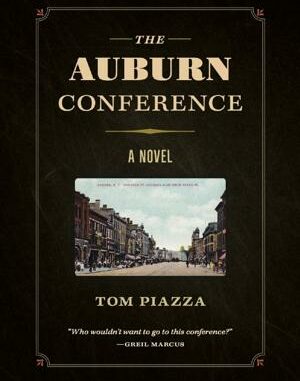
“The Auburn Conference” by Tom Piazza, University of Iowa Press, 200 pages
No, Tom Piazza’s fourth novel is not about some school in Alabama nor the SEC or any other football conference. It’s about a literary conference held in Auburn, New York, in 1883 at a fictional college where Mark Twain, Herman Melville, Walt Whitman, Frederic Douglass and other literati sat down to ponder the state of the nation and its likely future.
A junior instructor, Frederick Olmstead Matthews, has maneuvered the petty and stolid administration of his college into sponsoring the symposium with the argument that it would be good for the town’s businesses and the school’s reputation. His goal, however, was loftier: to define what it meant to be an American in this period following the Civil War. He also wished the prominent writers to consider whether literature should be mere entertainment or a vehicle for affirming the hard-won liberties of America.
Piazza, exciting storyteller that he is, excels in characterizing the writers, their public masks and their private selves, with an insight and sensitivity that evokes feelings of empathy and intimacy in the reader. Thus, as their discussions proceed, the reader can’t help but identify with one speaker or another in the emotional fireworks that are kindled by their conflicting passions, temperaments, philosophies and interests.
The proposed topics are indeed weighty, but controversial. The most explosive episode portrays the tirade that Melville directs at Whitman, accusing him of a self-centered, thoughtless optimism and celebration of the ordinary, merely a maker of lists and not a real poet.
Harriet Beecher Stowe is so bored and bitter that one wishes she’d stayed home.
So the conference is emotionally fraught enough that after the first morning’s session, Melville has to find a tavern.
When he returns to make his solo address, he seems to have forgotten why he is at the podium. After a long pause and then a few remarks, he concludes by singing a sea chanty. This is the funniest scene in a very humorous book that at times comes close to satire.
The humor is so lively and often so wicked that a reader could just enjoy the fun and wait until later to think about the civic questions being posed. Piazza insists that Americans suffer from historical amnesia and fail to recognize and resolve problems that have existed since before the time of the Civil War and the conference. Humor, arising from impatience if not anger, is one means for Piazza to accuse Americans of ignoring the repetition of racial and gender inequities, the ceding of unwarranted power to would-be dictators, boundless greed and the exploitation of workers, and other abuses of our freedom.
There’s a theatrical element to the structure of the book as the scenes shift from the railway station to the conference floor to the dining room and to other settings. Each character makes an entrance in turn, bringing Douglass’ charisma, Twain’s bonhomie, and other auras as already noted.
Harriet Tubman makes a brief appearance as host to Douglass at her home, which actually was located in Auburn, New York, at the time. A caricature of a romance writer has been invited to inspire attendance, and a Confederate general comes and is shunned as a representative of the “other” side.
A wispy character whose identity is not explicitly stated glides here and there, now and then, but long enough to develop a crush on Frederick. She is drawn to his earnestness and the lock of hair falling over his brow. When she withdraws, she slips him a note with a few lines of poetry as elusive as she herself. Who could it be but Emily Dickinson, out on a rare adventure?
Despite his combativeness and his performance as the drunken sailor, Melville emerges as the most thoughtful, and certainly the most tortured, of those present. In one episode when he is alone, he is battered by a barrage of disorganized, exhausting thoughts. This passage is painful to read but a testament to Piazza’s virtuosity as a writer.
Piazza is, in addition, a figure of great versatility, author of not only novels and short stories, but nonfiction, notably the manifesto, “Why New Orleans Matters.” Many readers know him as a knowledgeable musical essayist and as a writer for the television series “Treme.” As might be expected, he is a New Orleanian.
Matthews is a young man in “The Auburn Conference,” so it’s plausible to imagine that he would long remain a cultural gadfly, exposing more secrets and abuses of the Gilded Age, or later threats to the precious legacy of freedom promised to Americans. Piazza could give him a role in future dramas of liberty and literature, so let’s hope he does.



Leave a Reply